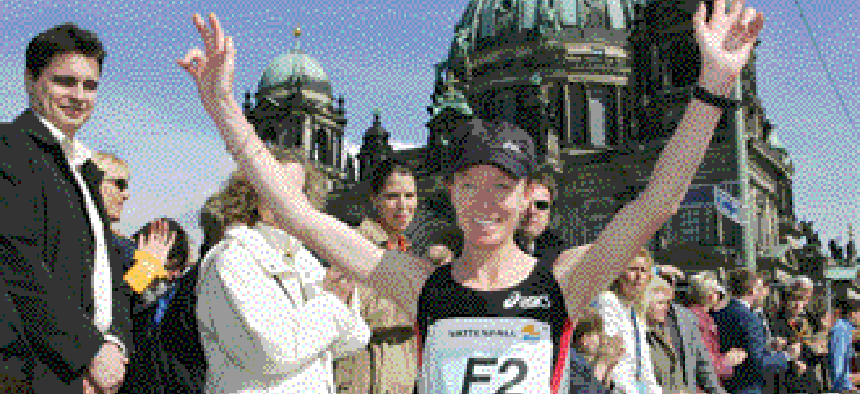Deena Kastor | Survival Guide: Perspectives from the field

When long-distance runner Deena Kastor crossed the finish line under the blazing Greek sun at the Athens 2004 Olympic Games, she became the first American to win a medal in the marathon in the last 20 years.
When long-distance runner Deena Kastor crossed the finish line under the blazing Greek sun at the Athens 2004 Olympic Games, she became the first American to win a medal in the marathon in the last 20 years.Her journey along the route that Pheidippides took in 490 B.C. to report Greece's victory over Persia was not easy. The course was riddled with steep uphill stretches and precipitous downhill slopes.At the five-kilometer mark, Kastor was in 28th place. By the halfway point, she had moved up to 12th place and was running strong while others were fading. Despite the brutal heat, she kept up her pace to lead the field across the finish line.Kastor's success was no fluke. She trained intensely for the specific course. Even after the race's bleak beginning, Kastor and her coach stuck to the plan they had devised. While other runners succumbed to the hills and heat, Kastor passed them one by one on her way to the medal podium.Kastor's goal-setting, planning and perseverance can be applied to a plan to achieve excellence in business and life. She recently discussed with Staff Writer Doug Beizer her road to success. I read somewhere that you said "on paper," you weren't really considered a medal contender in the Olympics. So you and your coach came up with a course-specific plan and stayed with it, even when you were falling behind the leaders. How tough was it to stick to your plan? In 2004, I was deciding between competing in the 10,000 meters on the track or the marathon. I knew that my best chance for a medal was in the marathon, so I trained specifically for the Athens race. What was going through your mind at the halfway point when you still had a lot of competitors to catch? I didn't actually know that the leaders went out as fast as they did. I thought my race plan would get me the gold medal, but it took me longer to catch the leaders. I realized this a little too late in the race and was forced to run a very aggressive last three miles. Do you think that what you did in that race can be applied in business or life ? coming up with a plan and sticking to it? I think the biggest lesson is training specificity. We ? coach, training partners, husband, physiologist, me ? trained for the heat and humidity by wearing extra clothing in practice. We trained on very hilly terrain, etc. We then made a plan and believed in the preparation and the racing. You've enjoyed some great success since Athens. How are you able to keep focused on training to compete at that level? I am always one to look ahead at the next goal. I am quick to give myself a pat on the back, but immediately focus on the next great race or thing I want to accomplish. What kind of role does technology play in training and racing at your level? I have a physiologist that I work with. Mike Shannon has analyzed my VO2Max [maximal oxygen uptake] every year for the past nine years. It's a good way to see progress, confirm that my past training is helping me become stronger, faster or more efficient, and to structure future training. I live and train in Mammoth Lakes, Calif., at 8,025 feet altitude. It was always hard for me to sympathize with teammates who were having trouble working out and training at 7,000 feet to 8,000 feet.Before Athens, Mike put me through a test to see at what elevation my body started to react to altitude. In a resting state, I was efficient until I got to the equivalent of 12,000 feet. No wonder I could run so easily at 7,000 feet. We adjusted and moved one workout a week up to the elevation of 9,000 feet ... I felt a difference. You have a Web site, and we're conducting this interview by e-mail. How tech-savvy do you consider yourself? What gear do you have: laptop, BlackBerry, iPod? I have it all. I do not consider myself technologically savvy. The only thing I know how to do on the computer is hit the "reply" button and Google some random fact or item. I am a new owner of and love my iPod. When I need a little help getting out the door for my second run, the music gets me charged. What about your fellow athletes, are most of them tech geeks or technophobes? Most of my training partners have MP3 players, computers, cell phones and the like. They seem a lot more comfortable with the whole thing.

WT:
Kastor:
WT:
Kastor:
WT:
Kastor:
WT:
Kastor:
WT:
Kastor:
WT:
Kastor:
WT:
Kastor:

Olympiad Deena Kastor was the first American to win a medal in the marathon in the last 20 years.
Victah Sailer
WT:
Kastor:
WT:
Kastor:
WT:
Kastor:
WT:
Kastor:
WT:
Kastor:
WT:
Kastor:
WT:
Kastor:
NEXT STORY: Eyes on the prize